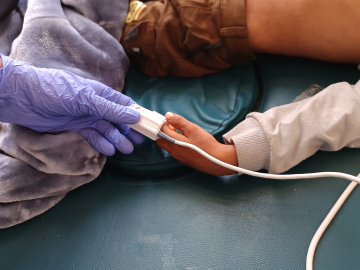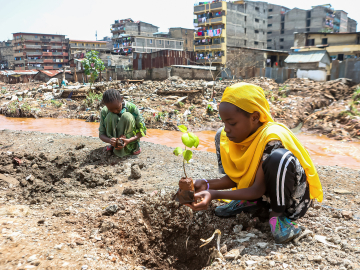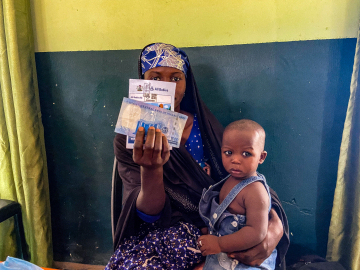Peter Hotez: It’s Time for Scientists to Speak Up for Science
HOUSTON – Peter Hotez has 2 words for his fellow scientists: Speak up.
A venerable vaccine researcher and dean of the National School of Tropical Medicine at Baylor College of Medicine, Hotez says he and other scientists of his generation were taught to do science and avoid speaking to the media and the public.
The “cone of silence culture,” as he calls it, hasn’t worked out very well. With adroit social media messaging, anti-science movements—including those that undermine the value of vaccines—have been able to seize the public discourse.
Hotez says he is uniquely positioned to respond: He’s a vaccine scientist, a pediatrician-scientist and an autism dad. His latest defense of science is a new book, “Vaccines Did Not Cause Rachel’s Autism” (Johns Hopkins University Press). The book seeks to clear some people’s muddied perspectives on autism and vaccines while also sharing his journey with his daughter Rachel.
Tell us about your book.
It is a science book that talks about the science showing there’s no link between vaccines and autism, what autism is and how it’s a developmental pathway that begins prenatally. But then it all changes with a very personal story because I’m also an autism dad. It explains what it’s like to be a parent of an adult with autism and associated intellectual disabilities.
You’ve taken on people who are against vaccines. How has that gone?
So far, it’s pretty rocky. The anti-vaccine groups are pretty aggressive and they’re very effective in their use of the Internet and social media and … cyber bullying. It’s a tough one. In some ways this is my toughest battle yet.
What specifically have you faced?
Well, they make up things. They always say I’m a shill for industry. Even though I’ve never taken any money from the vaccine industry. My favorite is when they say I’m secretly making millions of dollars off of vaccines for schistosomiasis and hookworm and Chagas disease and leishmaniasis, to which my wife says, “If only. We could finally pay off our mortgage.”
Did you anticipate being a target like this?
I knew they are pretty aggressive. I saw how they beat up some good colleagues of mine on vaccines, but I felt that I had a unique voice as both a vaccine scientist, a pediatrician-scientist and as an autism dad. Who else could do it? So I felt in some ways chosen to do this. And that’s why I do it.
Do you understand the motivation for the people who are against vaccines? What is that—
I ask this all the time. What’s driving this and who’s paying for this garbage? I mean, there’s money behind it. There’s no question about it. Where is it coming from? I think we need good investigative journalist to kind of really figure this out.
Do you have any sense of how things are trending—in a positive way or are we still in a trough where things are going to be more difficult for science?
Well, I think it’s a good news, bad news, bad news story. We’ve seen now dramatic declines in deaths globally from vaccine preventable diseases. Big reductions in deaths from measles and pertussis and tetanus and haemophilus influenza type B or near eradication of polio. So that’s an amazing success story.
But while that’s going on … we have the unraveling of those successes in Europe and North America. And we’ve got some clear trends. We’ve got this dramatic return of measles across Europe. Big drops in vaccine coverage, especially in the western parts of the United States. Tens of thousands of people dying of influenza who didn’t need to die of influenza. Ridiculously low uptake of the HPV vaccine for cervical cancer---unnecessarily subjecting a generation of girls and women in the US to cervical cancer. This is terrible.
And what’s interesting is the general silence on the pro-vaccine side. We’re not hearing from the CDC. We’re not hearing from the Surgeon General. We’re not hearing from the major societies. So that’s one of the reasons I wrote the book. I felt there needed to be a voice saying, “No mas, we’ve got to stop this thing.”
Is it going to take a vaccine-preventable epidemic before the anti-vaccine side really appreciates their value?
It’s going to take a big measles outbreak with measles deaths to really wake people up and to do something about it. And even then, in Europe it really has not stimulated a lot of action. And it’s very frustrating because you can see this train coming 2 miles down the tracks.
And it probably will be measles because it’s so easily transmitted?
Measles tends to be the often the first breakthrough infection you see because it’s so highly transmissible. It’s one of the most infectious agents we know about. It has a reproductive number of 12 to 18. So a single individual gets measles, 12 to 18 other unvaccinated individuals get it.
Should scientists counter anti-vaccine messages with similarly powerful, boiled-down messages?
You raise a very good point. So, boiled down messages, that’s actually a very profound question because one of the things that I have done in this book, which is really taking me out of my comfort zone, is I speak and I write in simple declarative sentences. Vaccines don’t cause autism. And that’s not how we speak [as] scientists.
If you look for instance the IOM report … in 2012 or 2013. They will say something like, “Well, the preponderance of evidence today cannot show any clear link between vaccines and autism.”
As scientists, we understand what that means, but the general public says, “What are they covering up? What do they really mean?” I try to close the door on that by speaking in straightforward sentences. Vaccines don’t cause autism. Here’s why. Again, that’s not the way that we often speak, but maybe we should. Maybe this is part of the training we have to give to young scientists, is how to craft messages, how to speak to the public in a way that they’ll understand.
But scientists are often very cautious, very aware of nuance and say: “Well we know this in this particular situation, but we don’t want to generalize beyond that.”
We don’t like to go out over our skis in terms of the evidence. That’s our training too. And I think when we speak to each other as scientists, that still holds. But I think we’re losing the public in our ability to message what we’re doing.
What would your message be to your fellow scientists? Do you see it as the responsibility of being a scientist to be a public voice for science?
I think if you have the capability and the drive, I think there is a component of responsibility to it because we’ve now seen the consequences of not directly engaging the public. For the first time now, we’re starting to see people dying because they’re not being vaccinated for phony reasons.
What do you tell your students?
It’s funny you ask because I have a new paper out in PLOS Biology called “Crafting your scientist brand” for a sort of how to, how to do it. When I talk to [scientists and students] about engaging the public … I’ll usually have a line of students coming up to me afterwards basically saying, “Okay, we’re all in. We get it.” Which is really nice. The hard part is we don’t have straightforward career pathways for how you get involved with public engagement in science. There’s no real roadmap. Even for me, it’s sort of seat of the pants learning. I was never formally trained in policy or advocacy and learning it as I go.
Do you see that as an important requirement going forward to educate young scientists in communications?
I think it hasn’t totally crept into the DNA of our training yet, but I’m hoping that will change. I think it’s necessary because things are not getting any better. So as we’re speaking today, the CDC has just released information that 80,000 people died in this year’s flu epidemic. Terrible year, including more than 180 children and most of those children we now know were not vaccinated, even though the recommendation was that they get vaccinated. So the anti-vaxxers won. It is a Pyrrhic victory, but they won, and tens of thousands of people died who didn’t have to die.
People are now starting to die from anti-science movements, and there’s no one else who can do this. It falls on the scientists to speak up. And that’s why I wrote the new book.
Ed. Note: This interviewed has been edited for clarity and length.
Join the tens of thousands of subscribers who rely on Global Health NOW summaries and exclusive articles for the latest public health news. Sign up for our free weekday enewsletter, and please share the link with friends and colleagues: http://www.globalhealthnow.org/subscribe.html
Vaccine scientist and autism dad Peter Hotez dispels autism myths in his latest book. (Image: Brian W. Simpson / Sept. 27, 2018)





